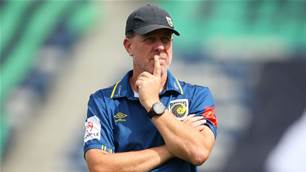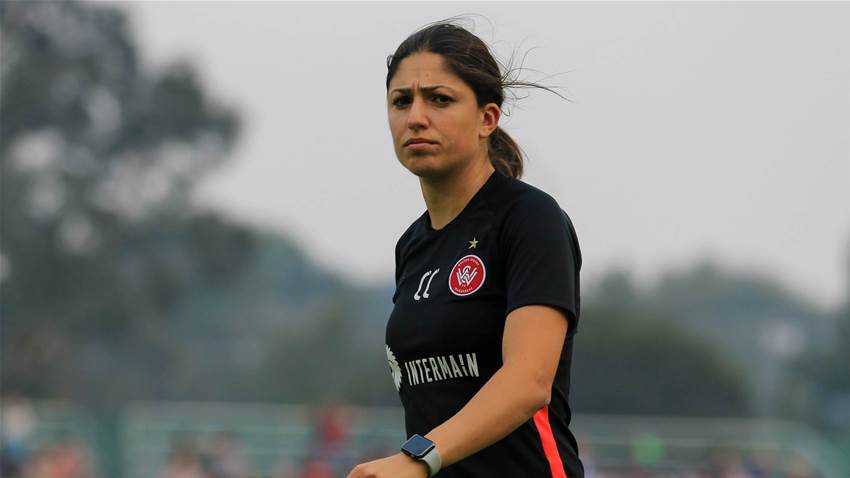Western Sydney Wanderers’ assistant coach Catherine Cannuli is touted by many as one of Australian football’s brightest future coaching prospects.
The 34-year-old former Matilda, who won four caps for Australia and played 55 W-League games for the Wanderers, Sydney FC and Brisbane Roar, has been in the dug out at Wanderland since 2017 and is one of the most respected figures in the women’s game.
Cannuli, a former Golden Boot winner in the now defunct NWSL, won a NWSL title with NSW Sapphires in 2003 and a W-League championship with Sydney FC in 2009. Despite such a glittering career as a player, she admits she has enjoyed the transition from the football field to the technical area.
“I love seeing players improve and progress as a footballer,” begins Cannuli. “It’s also very satisfying to be able to help them be better people first and then a better footballer.
“I have a lot more respect for coaches nowadays because as a player you have no idea as to what is involved behind the scenes.”
Cannuli’s coaching pathway started four years ago when she was a playing coach for the Southern District Raiders, in the NSW State League Women's competition.
She led the Raiders to back to back championships in 2016 and 2017. She was also a technical director for women’s football at the Southern Districts Soccer Football Association (SDSFA) in Moorebank.
Her success and pedigree saw the Wanderers sign her up to work alongside then coach Richard Byrne.
Cannuli is full of praise for the support she has had along the way, learning her craft with the help of some big names in Australian football. She specifically mentions former Matildas’ coach Alen Stajcic, regarded by many as the best coach the Australian women’s team has ever had.
“One key person is Alen Stajcic,” praises Cannuli. “Alen has supported me through my entire footballing career. More recently he has allowed me access to the Matildas and Future Matildas sessions. Alen has always been there to support along the way.”
Cannuli also went through the famed program at Westfield Sports High School, a breeding ground for some of the best footballers and coaches Australia has produced.
“I spent a few years working at Westfields Sports High School which was also great for my development as a coach as I had a great support network and exposure to a wealth of knowledge due to the diversity of coaches.”
Cannuli, who finished playing in 2014, admits she is thriving in the set up at the Wanderers, with the club’s inclusive culture being a major advantage for her as she pursues her coaching career.
“I have found that having our football HQ at WSW has been really advantageous. All WSW staff share the same office so this allows us to have football discussions with those involved in other leagues such as the A- League and Academy staff.
“I believe this is really important to model inclusion, respect, and support for all players.”
While playing numbers for women in Australia has never been healthier, the dearth in coaching stocks is somewhat of a concern. There are only 7,700 registered female coaches out of 38,000 across the country according to FFA’s latest annual report.
Cannuli believes the key to getting more female coaches is to encourage those who are already involved in the game to take up the opportunities that exist, and make it more visible.
“I think the main key is encouraging females who are already passionate about the game or are involved in the game.
“It’s also important for them to be exposed to role models so that those already involved in the game know that this is a possibility for them.”
Cannuli admits there are unique challenges faced by women in coaching, but she believes these can be addressed with the right support.
“I think one of the main challenges faced by females in coaching is the confidence to coach. I always knew once I finished playing that I still wanted to be involved in the game somehow.
“As I was growing up, coaching was not an option for females. We need to provide more opportunities and mentor programs to help female coaches along the way. The more female coaches there are, the more exposure females have, the more this possibility exists in their minds.”
The W-League has often been criticised for not having many female head coaches. In the season just finished, Heather Garriock at Canberra United was the only senior coach that was female.
Cannuli insists that providing opportunities for females is the only way to fix this. She is also confident these numbers will sort themselves out in the near future.
“We will only have more female coaches if we get more opportunities for female coaches to progress through the ranks.
“I know we currently only have three A licence female coaches in NSW. It is also really difficult as not many W-league jobs are full time and these coaching positions offer no job security.
“It’s a great initiative to see scholarships for females to attain coaching qualifications. This will increase the numbers of female coaches thus creating an increased pool of role models.
“I do think we will have more female coaches in the next five years.”
For now, Cannuli will be focussed on her role at SDSFA and taking the Wanderers further than their inaugural finals appearance last season.
Any women interested in coaching are urged to take the first step:
https://www.playfootball.com.au/ncdp/toolkits/female-participation/coaching
Related Articles

Stajcic lands Wanderers job as Lederer quits

Wanderers sound out ex-Hiddink disciple as focus turns to foreign coach













